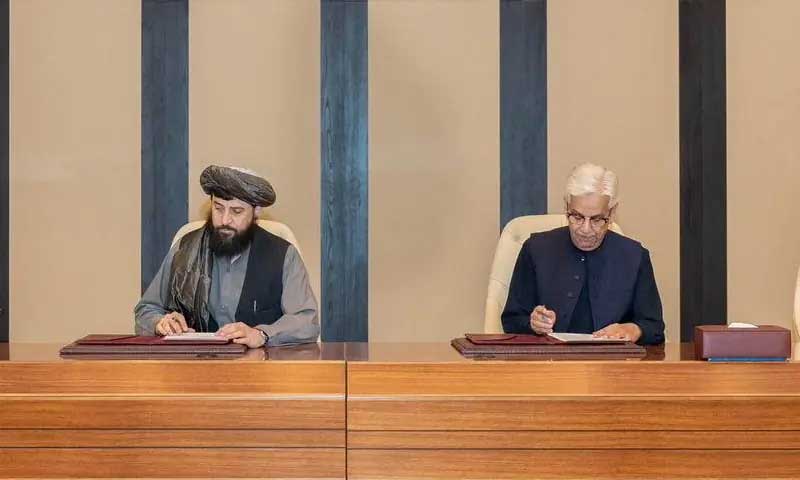- Web Desk
- 7 Hours ago
World Bank’s Pakistan development update: economy stays the course amid challenges
-

- Syeda Masooma
- Today

ISLAMABAD: Pakistan’s economy showed signs of stabilisation in FY2025, achieving low inflation and a record high primary surplus, according to the latest Pakistan Development Update Report released by the World Bank on Tuesday.
The report attributes this progress to fiscal consolidation and effective macroeconomic management, which have bolstered confidence in the country’s economic trajectory.
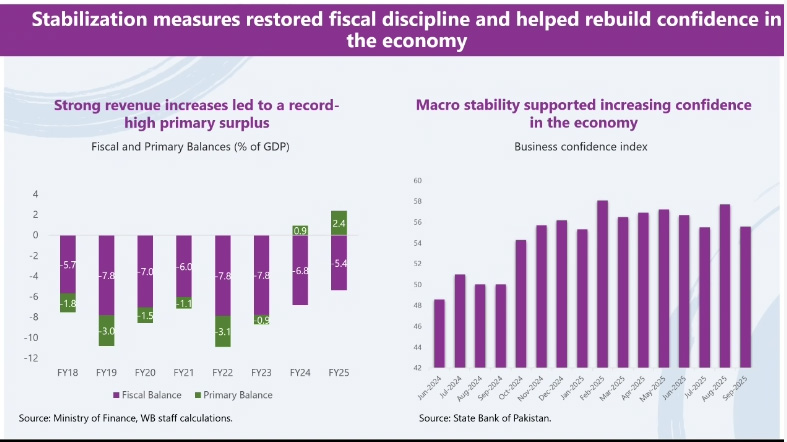
Despite these gains, the report warns that recent floods have posed significant risks to the initially positive outlook. The natural disasters have impacted agricultural output, prompting a downward revision of growth projections from earlier estimates. Economic growth is now expected to slow to 3 per cent in FY2025, before gradually recovering to 3.4 percent by FY2027.
“Pakistan has achieved macroeconomic stabilisation, but sustaining growth will depend on continued commitment to reforms,” the report noted. These reforms include maintaining a market-determined exchange rate and ensuring a fully functional interbank market to improve transparency and investor confidence.
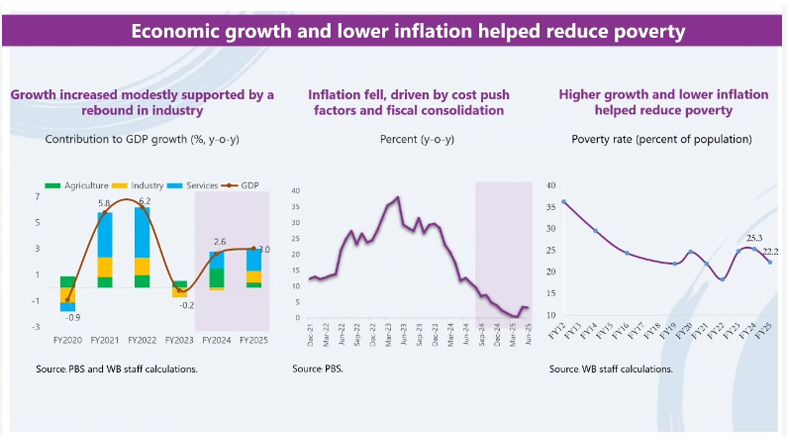
Data from FY2025 shows encouraging trends: industrial output rebounded, and inflation declined, largely driven by reduced cost pressures and disciplined fiscal policy. However, the update cautions that even with modest growth, economic expansion remains insufficient to bring about a significant improvement in living standards.
The report highlights a long-term concern: Pakistan’s declining growth potential over the past several decades. To reverse this trend, it calls for deep structural reforms aimed at improving productivity, enhancing competitiveness, and boosting private sector investment.
“Pakistan’s challenge is not just to grow, but to grow better,” the report concluded. “Staying the course on reforms will be critical to ensuring resilience and inclusive development in the years ahead.”
Among the recommendations of the report are breaking Pakistan’s recurring boom-bust cycle and achieving sustainable and achieving inclusive growth. That will require a strong focus on expanding exports.
Anna Twum, one of the lead authors of the report, said in her presentation that a vibrant export sector provides the foreign exchange needed to finance essential imports, such as machinery, energy, and industrial inputs, while helping to maintain external stability. Export-oriented firms also gain access to larger markets, fostering innovation through technology and knowledge spillovers. Moreover, exports serve as a powerful engine for job creation, offering new employment opportunities, particularly for women and young people, and helping to make economic growth more broad-based and resilient.
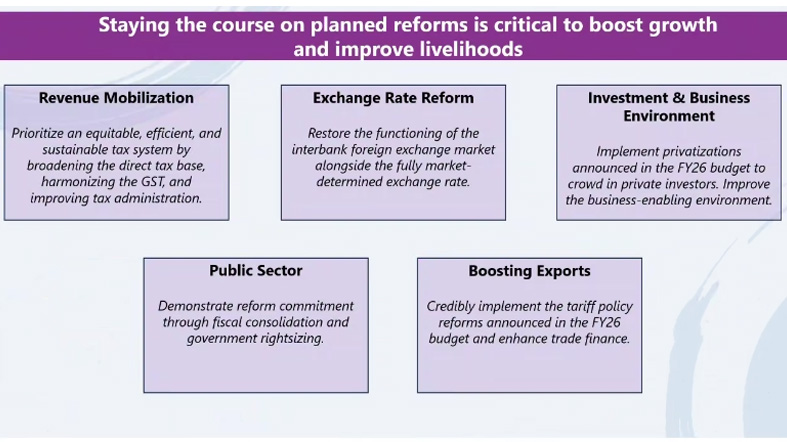
Pakistan needs to focus on export sector, where it has been lacking behind comparable economies. “Weak product and market diversification have left the export base highly vulnerable to global price and demand fluctuations,” Twum said.
FUTURE COURSE OF ACTION
Looking ahead, Pakistan’s path to stronger, more resilient growth depends on staying the course with structural reforms that enhance exports, the report recommended. The National Tariff Policy (NTP) represents a historic shift toward a more rational, efficiency-based trade framework. However, the success of this policy will hinge on consistent government commitment and the implementation of a broader set of complementary reforms aimed at improving competitiveness, lowering business costs, and integrating Pakistan more deeply into global value chains.
To achieve this, several key measures are needed. First, the cost of inputs for exporters must be lowered to reduce the longstanding anti-export bias in the trade regime. At the same time, maintaining a flexible, market-determined exchange rate will be essential to ensure export competitiveness and reinforce tariff reforms. Expanding access to trade finance, particularly for small and medium-sized enterprises (SMEs), will also play a crucial role in enabling more firms to enter and thrive in export markets.
Getting there will require decisive and sustained action. Pakistan must fully implement the tariff reforms envisioned under the National Tariff Policy and strengthen the National Tariff Commission to effectively monitor, evaluate, and address unfair trade practices by foreign partners. Trade negotiations should be refocused on securing further tariff reductions with both key and emerging trade partners to diversify markets and improve access for Pakistani products.
Pakistan needs to deepen its trade agreements and strengthen its capacity for international trade negotiations.
Equally important is the continued development of a deep and liquid interbank foreign exchange market. Publishing detailed data on market transactions and phasing out ad hoc interventions will help build transparency and allow the exchange rate to reflect genuine market conditions. The full operationalisation of the EXIM Bank will also be vital in supporting exporters with tailored financing products and risk mitigation tools. Finally, policy attention should prioritise new and high-potential export ventures, especially in technology, services, and value-added manufacturing, to broaden the country’s export base and secure long-term economic resilience.
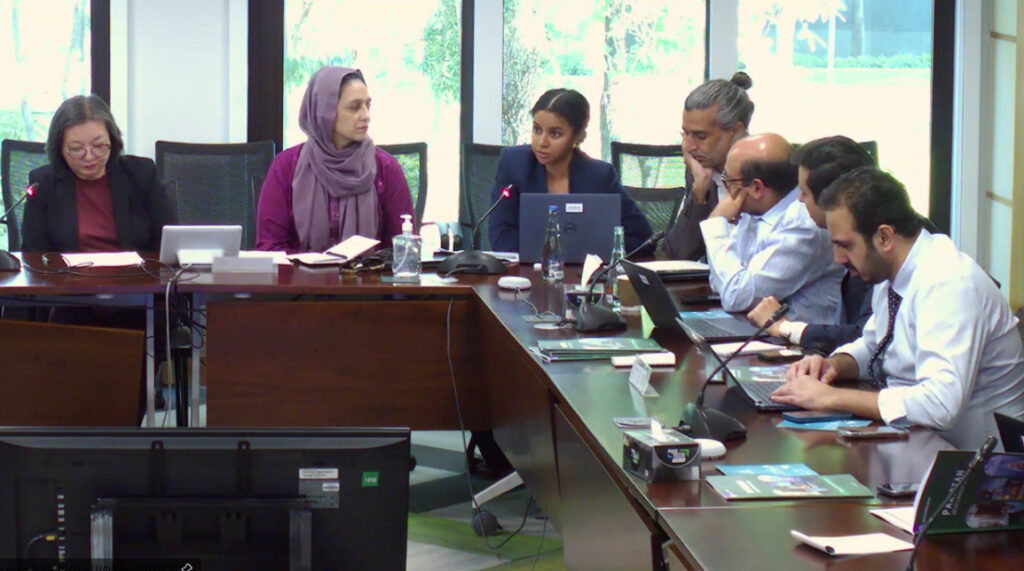
To boost export performance and unlock new markets, Pakistan needs to deepen its trade agreements and strengthen its capacity for international trade negotiations. Building the skills and expertise of negotiators through targeted training will enable the country to secure more balanced and beneficial trade deals. Upgrading existing Preferential Trade Agreements (PTAs) into comprehensive partnerships that include services, investment, and digital trade will help Pakistan integrate more effectively into global value chains. Additionally, trade attachés can play a vital role in identifying and pursuing opportunities in non-traditional markets such as Sub-Saharan Africa and Latin America, diversifying Pakistan’s export destinations beyond its traditional partners.
Closing critical infrastructure and connectivity gaps, especially in the energy and digital sectors, is essential to enhance competitiveness
At the same time, closing critical infrastructure and connectivity gaps, especially in the energy and digital sectors, is essential to enhance competitiveness. This requires continued implementation of cost-reduction reforms, including timely adjustments to electricity and gas tariffs to reflect market realities while improving the financial health of the sector. Strengthening the management of power distribution companies (DISCOs) will improve grid reliability, while accelerating National Fiberization Plans will ensure nationwide digital access. To position Pakistan for the digital economy, new and updated data governance regulations aligned with global standards are needed. Moreover, empowering the Pakistan Software Export Board (PSEB) to promote the country’s IT services abroad, streamline business procedures, and support export-oriented firms will be key to driving future growth in high-value digital exports.

